Comedian Simon Amstell heads for Scotland with his magical stand up show, Spirit Hole
This article contains affiliate links. We may earn a small commission on items purchased through this article, but that does not affect our editorial judgement.
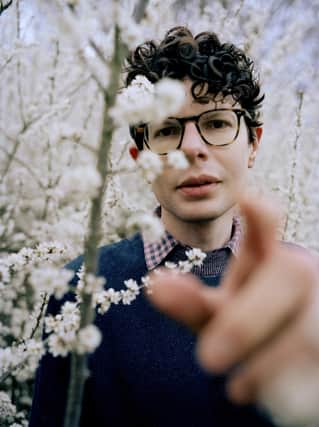

Not all comedians laugh as much as Simon Amstell. In fact offstage, some of them don’t laugh at all, which is fair enough since there’s a difference between telling jokes or performing stand up and being intrinsically funny or enjoying a laugh.
Simon Amstell, however, laughs a lot and it’s infectious. Interviewing him over Zoom about his latest stand up show, Spirit Hole, which is heading to Scotland next month, his chuckling and chortling delivers a serotonin boost that makes you join in and leaves you as enthusiastic as he is about love, sex, shame, mushrooms and more.
Advertisement
Hide AdAdvertisement
Hide AdIt’s not as if the award-winning standup, writer, filmmaker doesn’t tackle difficult, challenging issues - depression, fragile masculinity, veganism, relationships - but by putting himself firmly in the firing line with his honesty and self-revelation, the joke’s on him - which only makes him laugh even more.
Delayed by Covid, this latest live show builds on some of the themes in the previous one, Set Free, which is available on Netflix, and in his films Benjamin (2018 - on All 4), a bittersweet comedy romance starring Colin Morgan, and Carnage (2017 - on iPlayer), his mockumentary set in a future where veganism is the norm.
Amstell joins me from his top floor workroom in the house he shares in London with his boyfriend of ten years - “a philosopher and an economist”, says Amstell, and their cat, Moses. The walls of the light-filled room are patterned with rows of Post-its relating to work in progress and the sofa behind home “a Fraggle, a baby and a moose” soft toys.
Now 42, Amstell has two decades of success on stage, film and TV behind him. After creating a radio show at school, he started on children’s TV channel Nickelodeon in 1998, went on to present Channel 4’s Popworld and Never Mind the Buzzcocks as well as co-writing and starring in his own sitcom Grandma’s House on BBC2. His stand up career saw him first perform at the Edinburgh Fringe in 2005, returning annually, and by 2009 his entire run was sold out and his tours became international. He has won two British Comedy Awards, an RTS Award, a Broadcast Award, a Chortle Award and a BAFTA nomination.
Amstell’s comedy is confessional, even when it’s fictional as in Benjamin, capturing his journey from depression and numbness, through awkwardness and failed relationships, coming out, depression, family, anxiety, so has he achieved happiness now?
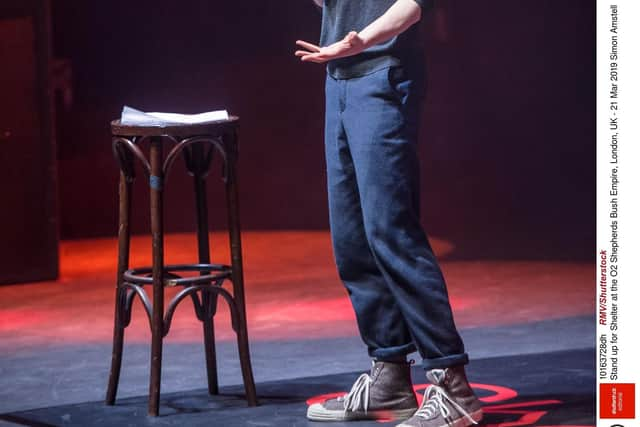

“Yes!” he says and laughs, a loud affair that ends in a high-pitched ‘aaaahhh’ as he regains control of himself. “Yes. Yes.”
OK, next question.
But this is Simon Amstell, who wants to give a thought-through, nuanced answer that requires several attempts to get exactly right, so he gives it another go.
Advertisement
Hide AdAdvertisement
Hide Ad“Yeah… oh god, it's such a complicated question. The really simple, but probably inaccurate, answer is yes.” More laughter.
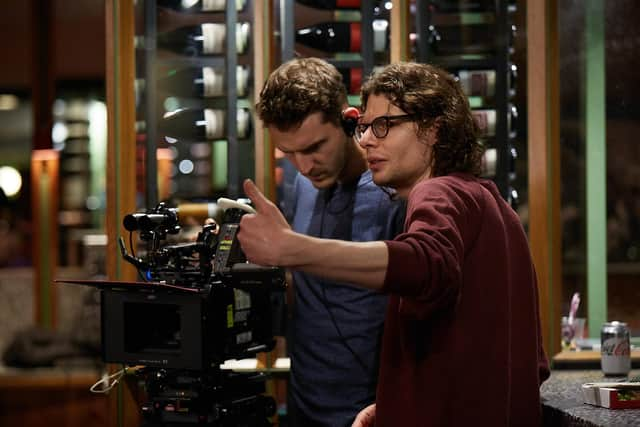

“I don't think actually it's about happiness in the end because obviously… . For a while the problem wasn't feeling unhappy. It was not being able to feel, so where I am in my life now is… I feel like now, it's not that I'm… God, sorry”.
He takes a breath and continues.
“What I became really grateful for after a lot of therapy was the ability to feel sad, actually. Ha, ha, ha. “And to come to the conclusion that when I was feeling something, it wasn't something that I should try and run away from. It's just…. that whatever the feeling is, it's asking… it's like there's a child self asking to be listened to. Often what's coming up, isn't…. Yeah, that's probably about right. That's probably the answer.” He laughs again. “Yes.”
Watching Benjamin, which is fictional but feels autobiographical, and his confessional stand up, the boundary between private and public is hard to gauge.
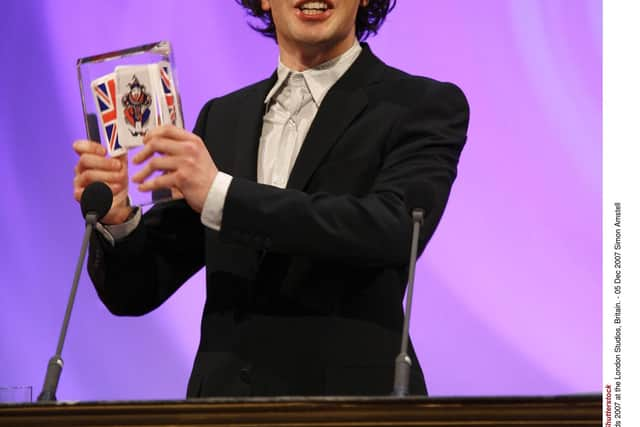

“Well, the line is drawn in terms of funniness,” he says. “Whether it's writing and directing that film, or performing a new show on stage, I'm only really interested in telling the truth because the truth is really funny and it also essentially frees. When you tell the truth, especially about stuff that you feel embarrassed or ashamed of, by saying these things out loud or by getting an actor to say things out loud for you, you're free of all this neurosis. You're suddenly able to be in a world in a way that you weren't before, to be yourself completely rather than a persona you are creating in order to be accepted.
“I don't like drawing any particular line between who I am and who I am in public, because that would be me telling myself that who I am is not acceptable, is not going to be loved. And that's a terrible place to be. That leads to anxiety and depression. Yeah, there you go. Ha, ha.”
But in order to be this honest Amstell talks about the people around him, his partner, his family. His explanation that his dad once said he wouldn’t be coming to see his show because it just wasn’t his kind of thing gets a big laugh. Does he ever check with them before he does a routine?
Advertisement
Hide AdAdvertisement
Hide Ad“Yeah. My boyfriend comes to warm-up shows and has a veto, but hasn't used it yet. What he tends to do is improve the joke by reminding me what I actually said or what actually happened and so it becomes better because it becomes more honest.
“And I'm a little bit more sensitive now with my dad. I think there were things I would have said about him in the past that now that I've healed from all that rage, hee, hee, hee, I'd be a bit more sensitive to his feelings. But at the time, I just felt more wronged and like I was the victim in the situation, so I felt like ‘I lived it and so I got to write it’.
“Often the stories are about ME being an idiot and even when I'm talking about how hurt I am by something my dad, for example, said or did or didn't do, what I come to usually is a feeling that the only healing that's going to happen is if I [italis] change, if I [italics] come to acceptance and surrender. So ultimately whatever I'm saying about anyone else, it's for ME to change, not them.
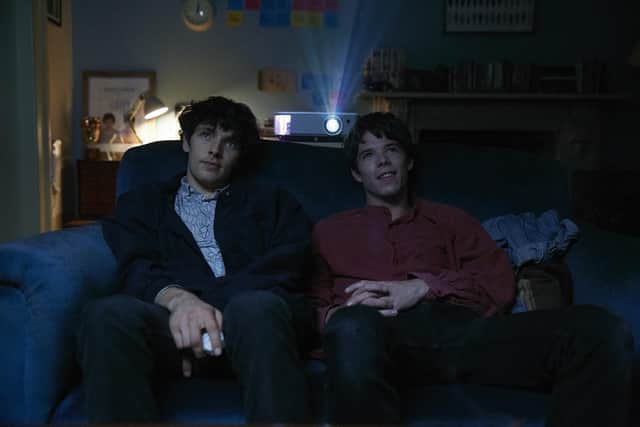

So with my dad it comes back to me not being a more… a more, broad comedian,” he laughs. “And me being able to see him as something other than a bad person. My perception of him shifts through the years. And he came to the show at the Palladium last year and he had a good time, so that was nice,” he says.
With much of Amstell’s comedy coming from talking about his experiences, does he embellish for laughs?
“I find that it isn't funny if I exaggerate or change facts. It doesn't work for me to embroider. If I'm struggling with a bit, the question I always ask is what actually happened? How were you actually feeling? What did you actually say? And then it comes alive, then suddenly I've got something that's really funny.”
Even the fictional Benjamin feels rooted in Amstell’s reality, the awkward conversations and embarrassing encounters, you can imagine him having had them.
Advertisement
Hide AdAdvertisement
Hide Ad“Yes. I didn't even realise how embarrassing it is for myself,” he says. “Like I've revealed myself to such an extent so when I'm in the edit for something like that film or a Netflix special, suddenly, I've got to stop. It's like I got carried away with myself and suddenly I’m sat in an edit watching what I’ve done and panicking that people are actually going see this. And I’m hiding under the table! But up until that point I'm really free to be as honest as I can remember.”
When I ask if Amstell still goes to counselling, the conversation turns to mushrooms, the magic variety, which he credits for helping, along with a trip to Peru where he took part in an ayahuasca ceremony, with past depression.
“No, there’s not much talking therapy anymore,” he says. “I tend to work a lot with magic mushrooms. Which certainly over the pandemic have been a real lifesaver. I work with them quite ceremonially. I take medicine quite seriously. There's a lot of ritual around it and intention setting, that kind of thing.”
Does he ever worry about advocating something that despite recent publicity and studies around their beneficial effects for sufferers of depression, might still be seen by some as controversial, or illegal? Does he get a sense that people disapprove?
“I don't know. I suppose the government do. I don't think it's completely legal. But I think things are changing because there's a lot of research around how good these mushrooms can be for stuff like anxiety, PTSD, depression. And that's the least of it. Once you really start getting involved in the mushrooms, you know, getting over anxiety, it’s like, ‘OK, we've done that. Now would you like to see the entire universe?’ OK, sure, why not?” He laughs and explains more.
“They come raw, in little vegan chocolates. We do a little ceremony where there’s a lot of gratitude to the earth who provided the mushrooms and the mushrooms themselves, and then we set the intention and then the ceremony begins. It’s the most incredible otherworldly… I mean it’s not otherworldly, it’s from this world.
“What's mad to me is that there's a mental health crisis in this country and there are these cures growing out of the ground. It seems like we haven’t yet been able to bring those two things together. But I think in time, there will be people feeling depressed, and they'll go to their GP and the GP will say: ‘Well, have you taken your mushrooms this month?’ He laughs.
‘Oh, no, no, sorry, I keep forgetting.’
‘Well, take the mushrooms!’
Advertisement
Hide AdAdvertisement
Hide Ad“In Peru, ayahuasca is just part of what's going on. It’s extreme for us but for the Shipibo tribe who conducted the ceremonyI was in a couple of years ago, the extreme thing would be to ignore ayahuasca. To not take ayahuasca, because people would think you are a LUNATIC. It would just be ‘what are you doing? You've gone completely insane. We have these healing plant medicines available. PLEASE take some Ayahuasca like everybody else is!”
“I know people are still suffering from something that I was suffering from. And you can’t just shove everyone on a plane to Peru. However, in this country, there are magic mushrooms growing out of the ground, which can have similar healing effects. And they’re not just inexpensive, they’re free! Right there in a field. It’s a free, antidepressant growing out of the ground.
“Of course it's better if you know what you’re doing. Setting is important. Being with people that you know and trust. Knowing what you're taking, all of this is important. But they’re all right there. And eventually it will become something more mainstream.”
With the mushrooms explained, what else would Amstell say is the stuff of his comedy?
“I noticed a few years ago, partly because of the titles of the shows - one was called To Be Free, the Netflix special was Set Free - I think all I’m doing each time is trying to free myself of who I currently am. Ha! In order to free myself, who I think I am.
“So I usually start in a place where my mind is addled, all my thoughts are confused and I'm scared and feel alone. And then by writing about it, by talking it out of me, going through it, or taking magic mushrooms, I'm freed of all this nonsense. And then that’s the show! So the big theme is freedom.”
What would Amstell say to those who argue that the reason we have a mental health crisis is not because we are struggling internally with who we are, but because of social inequalities that result from political or economic structures?
Advertisement
Hide AdAdvertisement
Hide Ad“Oh, yes, I agree with all of that,” he says. “Obviously it’s both. For me, I’m in a privileged position where my mental health problems were purely coming from within my body. In terms of my present situation, on Maslow's pyramid of needs, I'm doing OK. And before, I was lucky in my financial situation; that wasn't causing the problems. A lot of the problems have stemmed from growing up gay in Essex at a time where that felt impossible and that's an external factor that led to trauma, shame and ultimately mental health issues.
“But where I ended up, with this career I always wanted and a lovely place to live in North London, there is nothing in my present situation that was causing me problems. The external stuff was in the past but still very present.
“My boyfriend is writing a book about how to make society better, but that is not really my speciality. My speciality is making ME better, and then sharing that with people in the hope it's funny and might have a similar effect in a small way.”
Now that Amsell is happy and sorted, is he ever anxious that he’ll run out of material?
“I don't think you get happy and sorted. I think you become more connected with your body and soul. And I feel that when I've been funny because I'm anxious, I've been funny because I'm anxious, but I've also been funny despite it.
“What you need is distance, in order to be funny about depression. And the more I understand myself, the more ridiculous I can see I am. I'm funny because I'm ridiculous. I don't think I'm going to stop. Even if I have good practices in place in order to stay in my body and stay connected to my spirit: I dance around every morning like a lunatic. I listen to my body. I talk to my child self as often as possible to see how it's doing.
“I think funny remains because I’m going to carry on being a human being and human beings are innately funny because we're ridiculous.”
Advertisement
Hide AdAdvertisement
Hide AdFinally, what can he tell us about Post-its on his walls, the new things he’s working on?
“One lot is Spirit Hole, the stand up show, one’s a TV pilot script, which is too new to talk about but I’m very excited, and that lot are something else I don’t think makes sense yet. And we’re currently casting a new film which should shoot near the end of this year. It’s about a woman who is terrified of growing up and has to go on a journey to become an adult despite everything within her telling her she doesn’t want to.”
And will it be funny?
“Yes, funny in the way that Benjamin was hopefully funny. The woman is on a journey and anything funny that happens is because of her in that situation, not because I thought I should put a few more jokes in here.”
Clearly Amstell has been busy during the pandemic, after his tour was postponed.
“I feel like I’m very pregnant. There’s a lot to be brought out. And I’m excited to see Scottish audiences again. I really found my voice at the Edinburgh Festival and through writing those long shows figured out what I was as a comedian, so I like coming to Scotland. I haven’t been for a long time so I’m ready Scotland. I’m ready.”
Simon Amstell, Spirit Hole, 18 May, 2022, Perth Festival of the Arts, Perth; 19 May 2022, Queen’s Hall, Edinburgh, 20 May, Tramway, Glasgow.
For all 2022 tour dates, see www.simonamstell.com, www.ticketmaster.com
